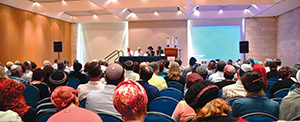
Jerusalem—For the second year in a row, the TZOHAR Rabbinical Organization had a dedicated Anglo track at its prestigious annual conference in Jerusalem.
TZOHAR, which is accompanied by the Hebrew byline halon bein ha’olomot (lit. a window between the worlds), aims to accomplish just this by trying to connect all different types of Jews together in setting rabbinic policies in the State of Israel. Through open discussion, reasonable compromises and groundbreaking projects, TZOHAR has revolutionized putting the “Jewish” into the Jewish State since 1995. While their main accomplishments have been in the field of marriage—their landmark project was the successful implementation of a network of rabbis who carry out weddings for more than 3000 couples every year without compensation, and at the beginning of 2015, they introduced a legally binding prenuptial agreement to help ensure that divorcing wives receive a get—they aim in general to encourage public discussion between rabbis and the Israeli religious public.
TZOHAR’s annual conference is a time for the organization’s leaders and other important policymakers to discuss the issues with interested citizens.
“This yearly conference, generally directed at the religious Zionist community, is a time to speak about important issues, like education, rabbinic issues and social issues… it’s a time for frank and open discussion about things going on in the Jewish world,” said Rabbi Reuven Spolter, head of TZOHAR’s overseas programming.
“The Anglo community in Israel is not simply growing in terms of numbers, but it also has a large influence on the character and makeup of our country, and in particular, within the Religious Zionist world,” said Rabbi David Stav, founder and president of TZOHAR. “It was therefore important to us to include an English component to our annual conference, and we very much hope that this will be welcomed and embraced by many.”
The day-long conference, located in Jerusalem’s Binyanei Ha’uma International Conference Center, hosted thousands of Israelis who joined to become part of the discussion to shape the future of religious policy in Israel. They were offered several different options of tracks throughout the day, including ones on education, family, army service, teaching, and even a closed conference for rabbis discussing specific issues for their leadership. In addition to all of these Hebrew-language tracks was a unique conference, offered for English speakers for the second year in a row.
“This track is geared towards the English-speaking Religious Zionist community,” Rabbi Spolter said. “We need to appreciate that we, as Anglos, face unique challenges living and raising our children in Israel. This conference highlights this understanding while creating a dialogue on many of the key issues important to Anglo olim.”
For English speakers, the day was divided into sessions covering very different but equally important topics. First off was a discussion about making Aliyah with older, teenaged children—the talk, led by Joy Epstein and Rabbi Yuval Cherlow, spoke about social integration methods, and ways to keep up self-esteem during a difficult language and cultural adjustment. Next up was a session entitled “Libi B’mizrach: Can Anglo-Israelis influence Diaspora Jewry?” with Rabbi Dr. Sholom Gold and Rabbi Doron Perez leading a discussion on how the denizens of the Jewish State can inspire their exiled brethren. Afterwards, the Anglo track joined all of the Israeli programs for lunch and then a memorial for Rav Aharon Lichtenstein, one of the major rabbinic leaders for the Religious Zionist world, who passed away a few months ago. The English speakers then returned to their room for separate and frank discussions for men and women on intimacy, and then back together for one final and very important session: a panel discussion with former MK Rabbi Dov Lipman, Ranana Rabbi Ronen Neuwirth and social media guru Laura Ben David, on the assimilation and influence of Anglo olim into Israeli society.
“It was very special to take part in this discussion,” said Rabbi Lipman in an exclusive interview with JLNJ. “Opportunities like this give us a chance to work together and get more involved in representing Anglos in Israel.”
The panel of these influential Anglo figures, moderated by Voice of Israel’s Josh Hastens, covered topics ranging from how to be heard in a room full of loud Israelis (all panelists agreed with Rabbi Lipman’s preferred method of banging loudly on the table, harking back to his days at Knesset committee and Yesh Atid meetings), trying to become influential as a minority (Laura Ben David recommended starting with petitions and running for local offices, to have Anglo voices heard) and even how to be taken seriously with an American accent (Rabbi Neuwirth, a sabra who served as a Bnei Akiva sheliach in Teaneck about 10 years ago, was able to commiserate with his experiences as an Israeli in America, concluding that the best approach is to keep on trying to speak the language no matter what, and eventually others will respond).
Aside from an outburst from a group of European congregants from Modi’in who expressed their displeasure at the assumption that one should try to learn Hebrew while living in Israel, this session was an enlightening 90 minutes, and everyone walked away from the panel discussion, and the day, feeling more strongly about living in Israel and trying to use their experiences and different background to help influence the Jewish State.
“It’s a big challenge to be different… no matter how much you’ve integrated, there’s always a glass wall between the Israelis and the olim,” said Rabbi Spolter,
Thanks to the discussions in the English-speakers track of the annual TZOHAR conference, Anglo olim now have the tools to break this barrier and work at making a difference in Israel.
By Tzvi Silver, JLNJ Israel










